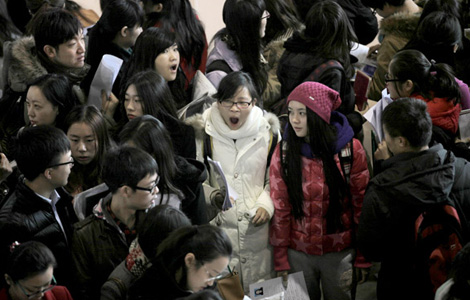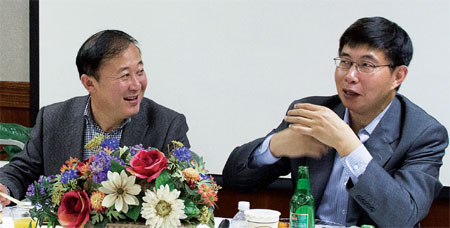Chinese university leaders visit Texas to round-up some ideas
Updated: 2013-12-27 06:17
By MAY ZHOU in Houston (China Daily USA)
|
||||||||
|
Zhang Yiqun (right), consul and director of education at the consulate general of China in Houston, talks to Zhao Ji (left), executive vice-president of Jilin University and delegation leader at the Chinese consulate general. May Zhou / China Daily |
A delegation of more than 20 leaders from 19 Chinese universities put their heads together at the Consulate General of China in Houston on Dec 19 to figure out ways to entice Chinese PhD graduates at US universities to come back to China.
Zhang Yiqun, consul and director of the consulate's education office, and Consul Duan Fenghua discussed with the delegation various incentive programs targeting the roughly 235,000 Chinese students studying in the US. Zhang also mentioned that Chinese universities welcome American students to study in China and encourage them to apply for scholarships provided by the Chinese government.
The delegation, consisting mostly of vice-presidents and vice-chairmen of university councils from China, had just completed a week of training and exchange programs at Rice University and Texas A&M and were meeting just hours before their flight home.
Delegation leader Zhao Ji, executive vice-president of Jilin University, said, "We touched on many topics. We learned about US universities' experiences and ways of governance, cultivating talent, commoditizing research results, fundraising, alumni relations, relations with the government and other issues."
Chinese universities are undergoing reforms and can learn from the US's sophisticated higher education system, Zhao said. "We are impressed by their third-party evaluation of college quality, guarantees of academic freedom and well-defined system with the nurturing of talent at its core mission, as well as consistent policies to encourage and support professors," he said.
Kelly Kleinkort, director of the Confucius Institute at Texas A&M University, said that "Texas A&M was very honored to host such a prestigious group of leaders from Chinese institutions of higher education".
She said that her university "welcomes the opportunity to be a part of enhancing university administration in China, sharing best practices, and global standards for educational administration. Additionally, this training opens doors for enhanced collaboration between Texas A&M University and Chinese institutions".
Sonny Lim, special assistant for international collaborations at Rice University, said, "My Rice colleagues and I are very happy to meet with the delegation members". He also offered a suggestion to future groups: organize the group by function to focus on the same subject for better in-depth discussion, and prepare presentations to talk about Chinese universities "because US university administrations want to learn from them also. When we collaborate with Chinese universities, we need to learn about the Chinese way."
Lim said that he and Rice University President David Leebron and his wife, university representative Y. Ping Sun, visited China in October of last year. "We are very interested in collaborations with China," Lim said. "We were very happy to be received by Vice-Premier Liu Yandong in Zhongnanhai imperial garden and met with the presidents of Beijing University and Qing Hua University."
Besides the official programs, Sun said she and her husband hosted the delegation in their home and invited some Rice professors to further exchange ideas in a more relaxed environment.
"During our visit to China we noticed that the Chinese government was investing heavily in higher education, yet in the US government is cutting back on university funding. This is really not a wise move. China and US definitely can learn from each other," Sun concluded.
mayzhou@chinadailyusa.com

 125th Rose Parade celebrated in US
125th Rose Parade celebrated in US
 Cold doesn't dissuade 'Polar Bear Swimmers'
Cold doesn't dissuade 'Polar Bear Swimmers'
 First photos of Liaoning battle group made public
First photos of Liaoning battle group made public
 US First Family out for shave ice in Hawaii
US First Family out for shave ice in Hawaii
 New Year's Eve celebrations in Times Square
New Year's Eve celebrations in Times Square
 Revellers embrace the New Year at Great Wall
Revellers embrace the New Year at Great Wall
 Israel frees 26 Palestinian prisoners
Israel frees 26 Palestinian prisoners
 Gen Y's motto: Show me the money
Gen Y's motto: Show me the money
Most Viewed
Editor's Picks

|

|

|

|

|

|
Today's Top News
Bill de Blasio: New York “won’t wait” to tackle inequality
Kim seeks ROK ties, warns US of nuclear 'disaster'
NGO sends SOS on funding
Strong China-US trade and investment links
Colorado starts marijuana retail
De Blasio sworn in as NYC mayor
News on Israel settlement delayed
Diplomacy to focus on neighborhood
US Weekly

|

|








